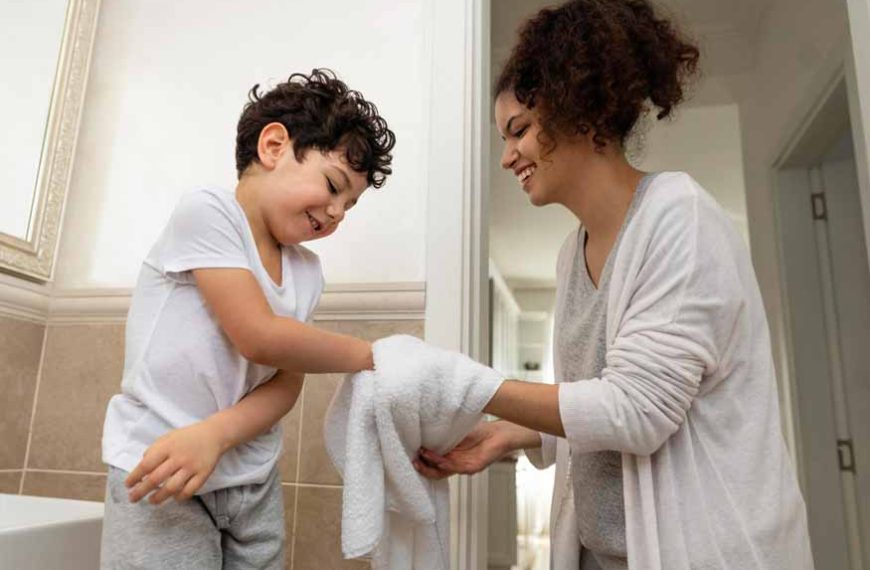Teaching our toddlers about the importance of personal hygiene is no easy task but our little ones are smarter than we realise and can be trained for anything. Toddler urination is not an easy one to talk about with them but one that is important to their well-being. In this article, we will talk about the importance of growing good hygiene practices, the problems most parents seem to face, practical strategies to overcome these problems and how to positively discuss proper hygiene with our little ones so they stay clean and independent.
What is the Significance of Proper Hygiene?
During the toddler years, when children are learning to move away from diapers and using a toilet, parents have a good opportunity to start teaching them habits that will last a lifetime. Beyond the immediate health benefits of toddlers learning to properly wash, dry and then keep their hands clean, they also learn a level of responsibility and independence from daily living which contributes to their overall cognitive development as well.
Choosing Positive Language
Words like pee, poop, and toilet should be introduced positively and matter-of-factly. Avoiding negative terms or associating their bodily functions with any form of shame is key to creating an environment in which they can thrive and feel supported. Choose your words wisely and ensure they emphasise that using a toilet is completely natural and one that we all have to do. Parents and other caregivers and their attitudes and language play a very important role in laying the foundation for a toddler to learn about personal hygiene.
The Right Potty-Chair
One of the most important tools in toilet training is the right potty chair. Ensure that your toddler’s feet can touch the floor while using the potty chair. This makes them feel more secure in their space. There will certainly be kids who may not care so much about this but the more comfortable and grounded they can feel, the more likely they will be successful. To make the experience more enjoyable, incorporating books or toys specifically designated for “potty time” can turn the process into a positive and engaging activity.
Setting a Positive Example and Empowering the Toddler
Children learn by observing so allowing toddlers to witness parents using the toilet and washing hands afterwards sets a positive example. This visual reinforcement helps toddlers understand the routine and importance of hygiene practices. Parents can take advantage of their natural curiosity to normalise the process as much as possible. Toilet training should be seen as a journey where the child gradually takes charge of their toileting. Engaging toddlers in conversations about this new responsibility helps them understand that using the toilet is just a part of growing up. Introducing children’s books depicting characters going through similar experiences can make the process exciting.
Recognizing and Understanding Signs
Recognizing the signs that tell us that a toddler needs to urinate is crucial for successful toilet training. Toddlers may exhibit signs such as grunting, squatting and freezing or their facial expressions may change. Parents should communicate with their toddlers about these signs, creating an understanding that these cues signify the need to use the potty. Praising toddlers when they express the need for a diaper change using words instead of actions encourages them to articulate their needs effectively.
Also Read – Toddler not peeing but not dehydrated
Establishing a Routine and Expecting Hesitancy
Routines provide toddlers with a sense of predictability and stability. Making trips to the potty chair a part of the daily routine helps toddlers understand the expectations. Seating toddlers onto the potty chair first thing in the morning can become a regular practice. For boys, starting with sitting down to urinate and later transitioning to standing up when ready can be introduced as part of the routine. Parents need to acknowledge that taking control of toileting is a significant step for toddlers. Hesitancy, reluctance, or a desire for parents to continue managing their toileting needs is common. Parents should approach these situations with patience, understanding that toddlers may resist the change. Gently guiding them through the process and allowing them to be in charge of cleanup fosters a sense of responsibility.
Transitioning to Big-Kid Underwear
A very symbolic change in the toilet training process is transitioning from diapers to big-kid underwear. There are many options out there! This step creates the idea that using the toilet is a part of growing up. Conversations about taking control and using the toilet instead of relying on diapers become very important during this transition.
Avoiding Power Struggles & Providing Praise
We excel at any age with positive reinforcement. This plays a strong role in encouraging toddlers to adopt healthy habits. Instead of using punishments, parents should offer precise praise when their toddlers successfully use the toilet. Focus your attention on what you want them to repeat. Toddlers are at an age where they are developing a sense of individuality and freedom. Toilet training can become an arena for testing limits, with some children resisting the process to assert control. It is crucial for parents to avoid power struggles during this phase. Recognizing that children control when and where they pee and poop, parents can create an environment that empowers toddlers to manage their own toileting needs.
Understanding and Addressing Fears
It is not uncommon for toddlers to have fears related to toilet training. Some kids truly believe that their bodily fluids are a very important part of them and feel anxious when using a toilet. It may not make sense to us but it’s very real to them. Many kids also have fears that they may get flushed away or that the toilet may suck them in somehow. Although this may seem impractical to an adult, make sure you are addressing this with empathy and allowing them to take control as much as possible.
This may seem like a lot to read through but remember that knowledge is power and each child is unique. Promoting proper hygiene during toddler urination is a vital aspect of their overall development and needs to be treated with care. Parents and other caregivers play an important role in creating a positive and supportive environment that fosters independence and responsibility. By choosing positive language, selecting the right tools like the potty chair, setting a positive example, understanding and recognizing signs, and avoiding power struggles, parents can help excel through this significant milestone. Teaching both boys and girls to wash their hands thoroughly after using the toilet establishes a lifelong habit. Addressing fears with patience and empathy contributes to a positive and healthy toilet training experience. Ultimately, embracing this journey as a learning experience and following the child’s cues will lead to successful and lifelong habits.
For more information, make sure you visit our website EuroKids
Disclaimer:
The information provided on this website is not a substitute for professional medical advice.EuroKids encourages you to consult with a qualified healthcare professional for any health concerns you may have. The information on this website is not intended to diagnose, treat, cure, or prevent any disease.
















